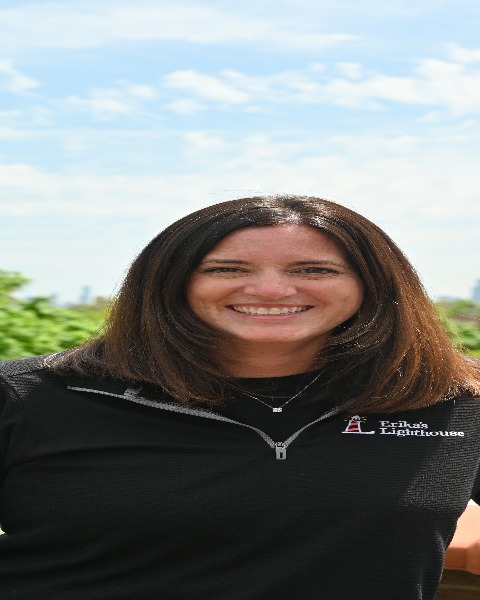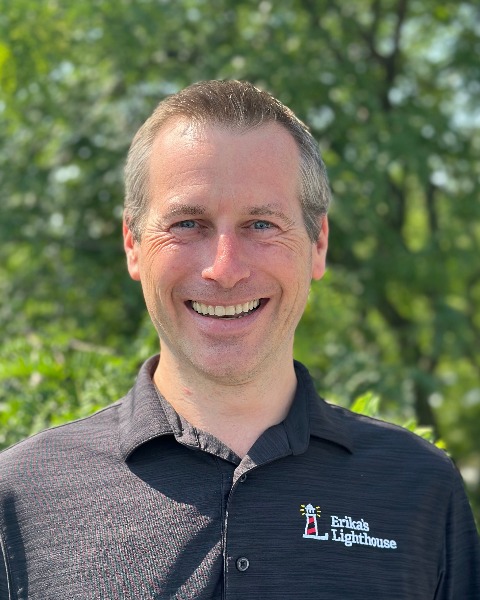Back
Youth / School / University
Promoting Early Identification: A Study on Youth Help-Seeking and School-Based Mental Health Education
Wednesday, April 2, 2025
11:00 AM – 12:00 PM East Coast USA Time
Location: Pheoris West C, 3rd Floor, Tower 402

Katie Conklin, M.Ed., LPC (she/her/hers)
Vice President of Programs
Erika's Lighthouse
Winnetka, Illinois, United States
Brandon Combs, MNA
Executive Director
Erika's Lighthouse
Winnetka, Illinois, United States
Speaker(s)
Body of Abstract: Adolescents are experiencing a significant increase in mental distress. The latest data from the 2023 Youth Risk Behavior Study underscores growing concerns about youth mental health. The report shows that 40% of high school students have experienced persistent feelings of sadness or hopelessness in the past year, up from 30% in 2013. Over 90% of individuals who die by suicide have an underlying mental health issue. Among U.S. youth ages 10-18 years, suicide is the second leading cause of death. There are specific subgroups of youth who are more at risk for suicide, including youth who are Indigenous or Female, identify as LGBTQ+ or have experienced racism. This means that early identification and intervention of mental health challenges is a key preventative factor for suicide.
Erika’s Lighthouse knows that young people, when equipped with the right tools, are capable of supporting their mental health and advocating for their health. Youth help-seeking and self-reporting is a key factor in supporting teens' mental health. However, as this report will demonstrate, many young people are uncomfortable talking about mental health and seeking help. It is important to identify ways to reduce this discomfort and help teens engage in meaningful conversations with trusted adults around mental health.
Erika’s Lighthouse wants to help students identify trusted adults and increase their comfort level with speaking to those trusted adults. This study was completed to evaluate Erika’s Lighthouse programs, collect valuable insights into teens' perspectives on help-seeking and trusted adults, and provide recommendations on new ways to increase help-seeking. Erika’s Lighthouse Classroom Education programs teach mental health literacy, depression education and suicide prevention with the goal of reducing stigma, normalizing conversations, encouraging good mental health and, especially, encouraging help-seeking. These 1-4 days programs are used in classrooms around the country to achieve these goals. A key provider of this type of education are school communities.
Erika’s Lighthouse programs are designed to be implemented within school communities, by school professionals. The data from this report was collected during the 2021-22, 2022-23, and 2023-24 school years from schools around the country teaching the Erika’s Lighthouse programs Level II and Level III and using the pre-program and post-program survey tools. A quantitative approach was used with diverse samples of students grades 5-12 across the U.S education system. The surveys were completed by students who participated in the Level II and Level III Erika’s Lighthouse programs with both pre-program and post-program surveys. A total of 18,077 pre-program surveys were completed and 15,271 post-program surveys across 515 schools. This group was broadly representative of the U.S. schools, including private, public and charter schools, as well as urban, suburban and rural. Students represented various socio-economic groups, race and ethnicities, and geographies. Student demographic data was gathered from school reported, public databases. The pre/post surveys include 8-9 questions. In this report, we share the responses to the following two questions as they are most aligned with student help-seeking: “Which of the following are examples of who could be a Trusted Adult (select all that apply)”. “I would be comfortable talking with a trusted adult about my mental health (select all that are true)”.
The findings showed that Universal programs are effective. Universal programs, otherwise known as Tier-1 programs, impact every student in a school community and are vital and effective in supporting youth help-seeking around mental health. Students reported an increase in identifying those who could be trusted adults. Other findings from this study highlight that there are significant gaps between who students know should be trusted adults; at home, school and in the community, and who they are comfortable with talking about their mental health. Additionally, students in Title I schools were 7% less likely to identify a teacher as a trusted adult, compared to Non-Title I Schools. 96% of students identified a Parent or Grandparent as a trusted adult, and over 75% of students were comfortable talking to a trusted adult about their mental health at home. This is, by far, the most important group for young people to turn to if they are in need. Lastly, when looking at race and ethnicity the gains from pre-program to post-program were more substantial for students in predominantly-Black and Hispanic schools, by 9% and 11%, respectively, compared to 7% for students in predominantly-White schools.
In conclusion, every young person should have a trusted adult in their life. The Erika’s Lighthouse universal, Tier-1 depression education programs are effective at increasing help-seeking behavior by helping youth recognize additional prospective trusted adults and increasing their comfort level in speaking to a trusted adult about mental health.
The Classroom Education programs are effective across all demographics, with every reviewed population seeing increases in the identification of trusted adults and the comfort level in speaking with trusted adults. While the programs are effective across all demographics, Title-I schools with predominantly Black or Hispanic populations showed greater gains in identifying trusted adults and comfort in speaking with a trusted adult. However, these schools still reported lower overall levels of trusted adults, highlighting the need for broader systemic changes to address mental health.
Erika’s Lighthouse knows that young people, when equipped with the right tools, are capable of supporting their mental health and advocating for their health. Youth help-seeking and self-reporting is a key factor in supporting teens' mental health. However, as this report will demonstrate, many young people are uncomfortable talking about mental health and seeking help. It is important to identify ways to reduce this discomfort and help teens engage in meaningful conversations with trusted adults around mental health.
Erika’s Lighthouse wants to help students identify trusted adults and increase their comfort level with speaking to those trusted adults. This study was completed to evaluate Erika’s Lighthouse programs, collect valuable insights into teens' perspectives on help-seeking and trusted adults, and provide recommendations on new ways to increase help-seeking. Erika’s Lighthouse Classroom Education programs teach mental health literacy, depression education and suicide prevention with the goal of reducing stigma, normalizing conversations, encouraging good mental health and, especially, encouraging help-seeking. These 1-4 days programs are used in classrooms around the country to achieve these goals. A key provider of this type of education are school communities.
Erika’s Lighthouse programs are designed to be implemented within school communities, by school professionals. The data from this report was collected during the 2021-22, 2022-23, and 2023-24 school years from schools around the country teaching the Erika’s Lighthouse programs Level II and Level III and using the pre-program and post-program survey tools. A quantitative approach was used with diverse samples of students grades 5-12 across the U.S education system. The surveys were completed by students who participated in the Level II and Level III Erika’s Lighthouse programs with both pre-program and post-program surveys. A total of 18,077 pre-program surveys were completed and 15,271 post-program surveys across 515 schools. This group was broadly representative of the U.S. schools, including private, public and charter schools, as well as urban, suburban and rural. Students represented various socio-economic groups, race and ethnicities, and geographies. Student demographic data was gathered from school reported, public databases. The pre/post surveys include 8-9 questions. In this report, we share the responses to the following two questions as they are most aligned with student help-seeking: “Which of the following are examples of who could be a Trusted Adult (select all that apply)”. “I would be comfortable talking with a trusted adult about my mental health (select all that are true)”.
The findings showed that Universal programs are effective. Universal programs, otherwise known as Tier-1 programs, impact every student in a school community and are vital and effective in supporting youth help-seeking around mental health. Students reported an increase in identifying those who could be trusted adults. Other findings from this study highlight that there are significant gaps between who students know should be trusted adults; at home, school and in the community, and who they are comfortable with talking about their mental health. Additionally, students in Title I schools were 7% less likely to identify a teacher as a trusted adult, compared to Non-Title I Schools. 96% of students identified a Parent or Grandparent as a trusted adult, and over 75% of students were comfortable talking to a trusted adult about their mental health at home. This is, by far, the most important group for young people to turn to if they are in need. Lastly, when looking at race and ethnicity the gains from pre-program to post-program were more substantial for students in predominantly-Black and Hispanic schools, by 9% and 11%, respectively, compared to 7% for students in predominantly-White schools.
In conclusion, every young person should have a trusted adult in their life. The Erika’s Lighthouse universal, Tier-1 depression education programs are effective at increasing help-seeking behavior by helping youth recognize additional prospective trusted adults and increasing their comfort level in speaking to a trusted adult about mental health.
The Classroom Education programs are effective across all demographics, with every reviewed population seeing increases in the identification of trusted adults and the comfort level in speaking with trusted adults. While the programs are effective across all demographics, Title-I schools with predominantly Black or Hispanic populations showed greater gains in identifying trusted adults and comfort in speaking with a trusted adult. However, these schools still reported lower overall levels of trusted adults, highlighting the need for broader systemic changes to address mental health.
Learning Objectives:
- At the conclusion of this presentation, the participant will be able to describe the importance of the role of school-based mental health education programs in promoting youth help-seeking behavior.
- At the conclusion of this presentation, participants will understand the gaps between students being able to identify trusted adults and their comfort level with speaking to those trusted adults.
- At the conclusion of this presentation, participants will be able to demonstrate knowledge around the importance of early identification and intervention through universal programs.
- After this presentation, participants will gain access to a free suite of comprehensive school mental health programs including classroom education, student empowerment, family engagement, staff training and schoolwide campaigns.
